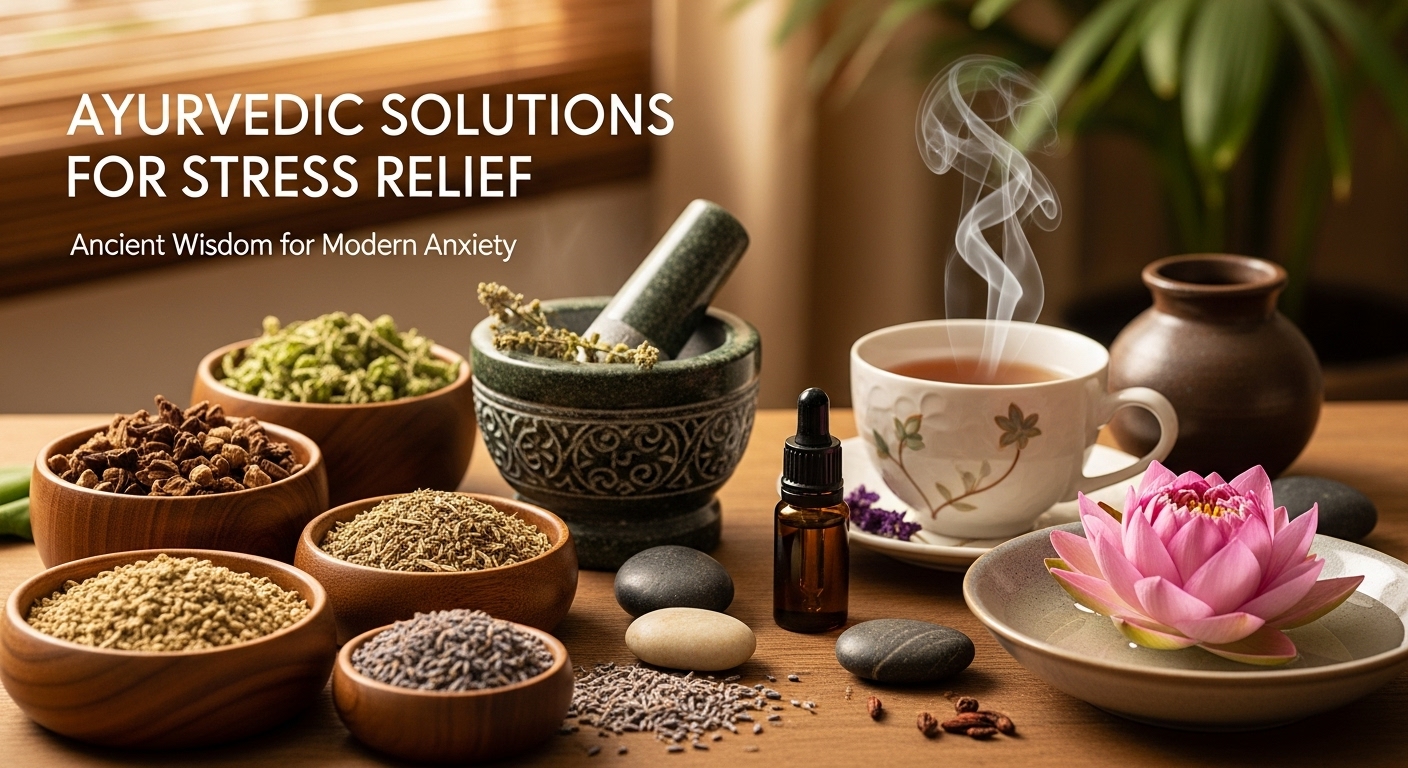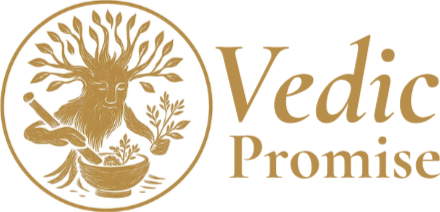
Ayurvedic Solutions for Stress Relief Ancient Wisdom for Modern Anxiety
Byashfaq1
- On
- InUncategorized
Introduction
You’re not imagining it – stress levels in modern society have reached epidemic proportions. According to recent studies, over 80% of adults report feeling stressed regularly, with anxiety disorders affecting one in four people globally. The consequences? Insomnia, digestive issues, weakened immunity, relationship problems, and a profound sense of being overwhelmed.
But here’s what’s fascinating: stress isn’t new. For 5,000 years, Ayurveda has recognized stress as a fundamental disruptor of health and has developed comprehensive solutions to address it at the root level – not just managing symptoms, but restoring genuine peace and resilience.
What makes Ayurveda’s approach unique is that it doesn’t see stress as simply “too much to do.” Rather, stress is understood as a fundamental imbalance in the nervous system caused by:
- Excess Vata dosha (air and space elements) creating anxiety, racing thoughts, and overwhelm
- Accumulated toxins (Ama) clouding mental clarity
- Depleted Ojas (vital essence) leading to burnout and vulnerability
- Disrupted daily rhythms confusing the body’s natural stress-response system
In this comprehensive guide, you’ll discover Ayurvedic solutions that address stress at every level – physical, mental, and emotional. These aren’t quick fixes; they’re time-tested practices that build resilience so stress doesn’t have to control your life.
Understanding Stress Through the Ayurvedic Lens
Stress and the Doshas
In Ayurveda, stress primarily aggravates Vata dosha – the principle governing movement, including the movement of thoughts and nervous system impulses.
Normal Vata Function:
- Clear communication between mind and body
- Smooth flow of breath
- Regulated heartbeat
- Calm, focused mind
- Good circulation
- Healthy elimination
Aggravated Vata (Stress Response):
- Racing thoughts and worry
- Irregular heartbeat and breath
- Digestive disturbances (constipation, gas)
- Insomnia or disturbed sleep
- Cold hands and feet
- Muscle tension and pain
- Difficulty making decisions
- Feeling scattered or overwhelmed
The Vicious Cycle:
Stress → Vata aggravation → More stress sensitivity → Further Vata aggravation
Good news? By calming Vata and rebuilding Ojas (vital immunity), you can break this cycle naturally.
The Ayurvedic Stress-Relief Protocol
Phase 1: Immediate Calming (For Acute Stress)
When you’re in the midst of acute stress or anxiety, these practices provide immediate relief:
1. Pranayama (Breathing Practices)
Why it works: Breath is the direct link between mind and body. Slow, deep breathing activates the parasympathetic nervous system (rest-and-digest mode) and calms Vata instantly.
Nadi Shodhana (Alternate Nostril Breathing):
How to do it:
- Sit comfortably with spine straight
- Close right nostril with thumb
- Inhale slowly through left nostril (count of 4)
- Close both nostrils, hold breath (count of 4)
- Open right nostril, exhale slowly (count of 4)
- Inhale through right nostril (count of 4)
- Hold (count of 4)
- Exhale through left nostril (count of 4)
- This is one round. Repeat 5-10 rounds.
Benefits:
- Balances left and right brain hemispheres
- Calms nervous system immediately
- Reduces anxiety within minutes
- Improves mental clarity
When to practice: Anytime you feel anxious, before bed, or upon waking
4-7-8 Breathing (Ujjayi Breath Variation):
How to do it:
- Exhale completely through mouth
- Close mouth, inhale through nose for count of 4
- Hold breath for count of 7
- Exhale completely through mouth for count of 8
- Repeat 4-8 times
Benefits: Acts as a natural tranquilizer for the nervous system
2. Abhyanga (Self-Oil Massage)
Why it works: Warm oil applied to the skin pacifies Vata dosha, calms the nervous system, and creates a protective layer that helps you feel grounded and safe.
How to practice:
- Warm 1/4 cup organic sesame oil (or coconut oil for Pitta types)
- Before shower, massage oil into entire body
- Use long strokes on limbs, circular motions on joints
- Spend extra time on feet and scalp
- Let oil absorb for 10-15 minutes
- Take warm shower
Best time: Morning or before bed
Frequency: Daily during high-stress periods; 3-4x/week for maintenance
Bonus: Add a drop of lavender or sandalwood essential oil for extra calming effect.
3. Shirodhara (Professional Ayurvedic Treatment)
What it is: Warm herbal oil poured in a continuous stream over the forehead (third eye area)
Benefits:
- Profoundly calms nervous system
- Releases deeply held stress
- Improves sleep quality dramatically
- Balances hormones
- Treats anxiety and depression
Where: Available at Ayurvedic clinics and spas
Frequency: Series of 7-14 sessions for chronic stress
Phase 2: Daily Stress Resilience (Long-term Prevention)
4. Adaptogenic Herbs – Nature’s Stress Managers
Ayurvedic adaptogens are herbs that help your body adapt to stress by modulating cortisol and supporting adrenal function.
Top 5 Adaptogens for Stress:
A. Ashwagandha (Withania somnifera)
Sanskrit name: “Smell of a horse” (gives strength and vitality)
Why it’s #1 for stress:
- Reduces cortisol by 25-30% (clinically proven)
- Improves sleep quality
- Reduces anxiety scores significantly
- Supports thyroid function (often affected by stress)
- Rebuilds depleted energy reserves
Dosage: 300-500mg twice daily (standardized to 5% withanolides)
Best taken: With warm milk before bed for sleep; with breakfast for energy
Results: 2-4 weeks for noticeable effects
Research highlight: Study in Indian Journal of Psychological Medicine showed 88% reduction in anxiety scores after 60 days of Ashwagandha.
B. Brahmi (Bacopa monnieri)
Sanskrit name: “That which gives knowledge of Brahman (supreme reality)”
Why it’s powerful:
- Reduces anxiety without sedation
- Improves memory and learning
- Enhances focus and mental clarity
- Protects brain from stress damage (neuroprotective)
- Supports healthy cortisol levels
Best for: Mental stress, students, professionals, those with racing thoughts
Dosage: 300-450mg daily (standardized to 45% bacosides)
Best taken: Morning with food
Results: 4-8 weeks for full benefits
C. Tulsi (Holy Basil)
Why it’s called “The Elixir of Life”:
- Natural anxiolytic (anti-anxiety)
- Supports adrenal function
- Protects against stress-induced organ damage
- Safe for daily, long-term use
- Gentle enough for children and elderly
Best for: Daily stress management, general wellness
Dosage: 2-3 cups of tea daily or 300-600mg capsules
Best taken: Throughout day; especially calming in evening
Results: Immediate calming; cumulative benefits over time
